[ad_1]
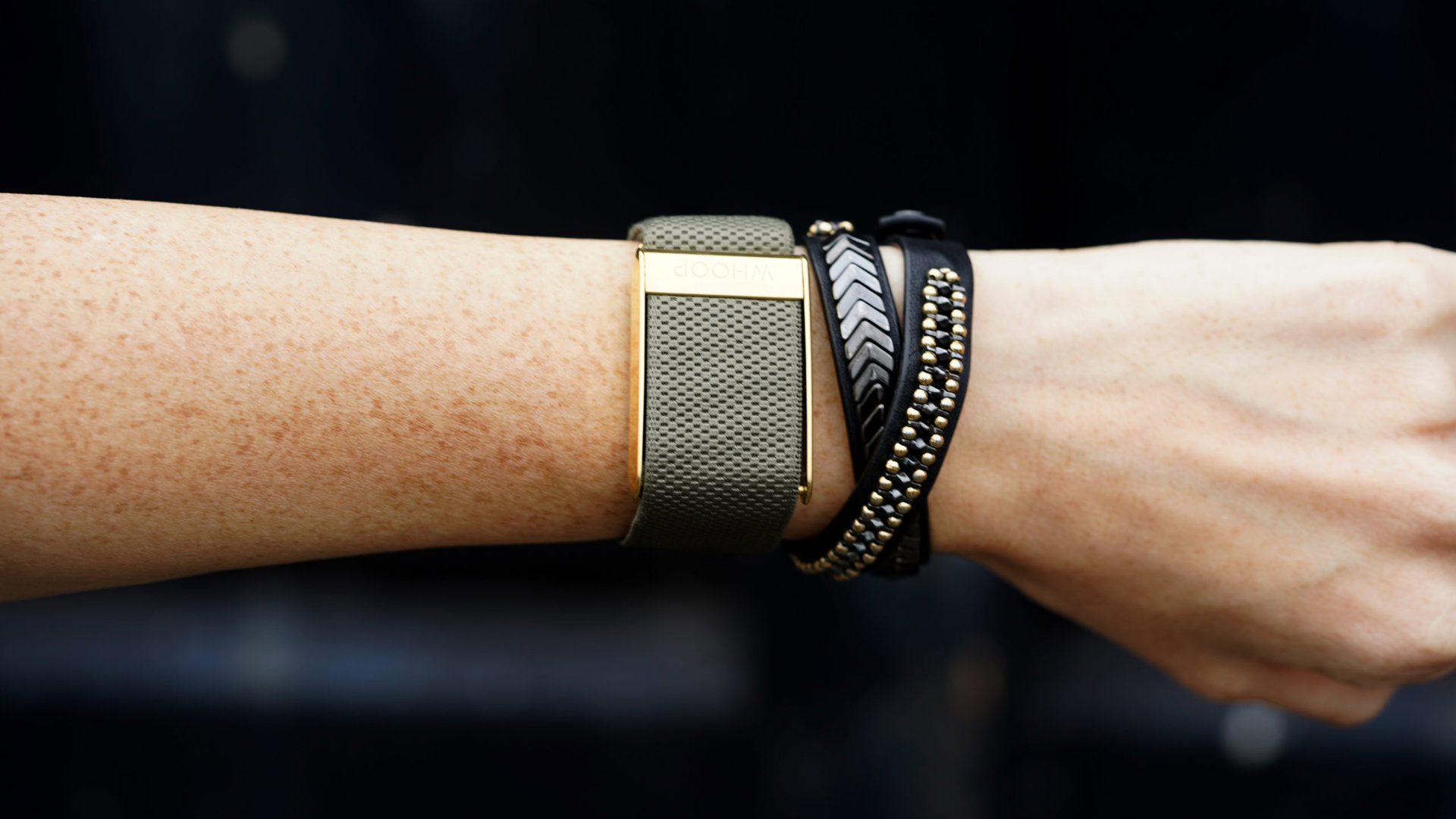
Kaitlyn Cimino / Android Authority
I will be the first to admit I was dubious about the Whoop 4.0. In short, a fitness tracker without a screen sounds a lot like a glorified bracelet. However, after nearly a month strapped into Whoop’s ecosystem, I humbly admit I’m changing my tune. The Whoop 4.0 hasn’t only convinced me a screen isn’t necessary, it has me questioning if I want to go back at all.
About this article: I tested the Whoop 4.0 for over three weeks. The unit was provided by Whoop, but Whoop had no say in the direction or published content.
A truly fashion-forward wearable
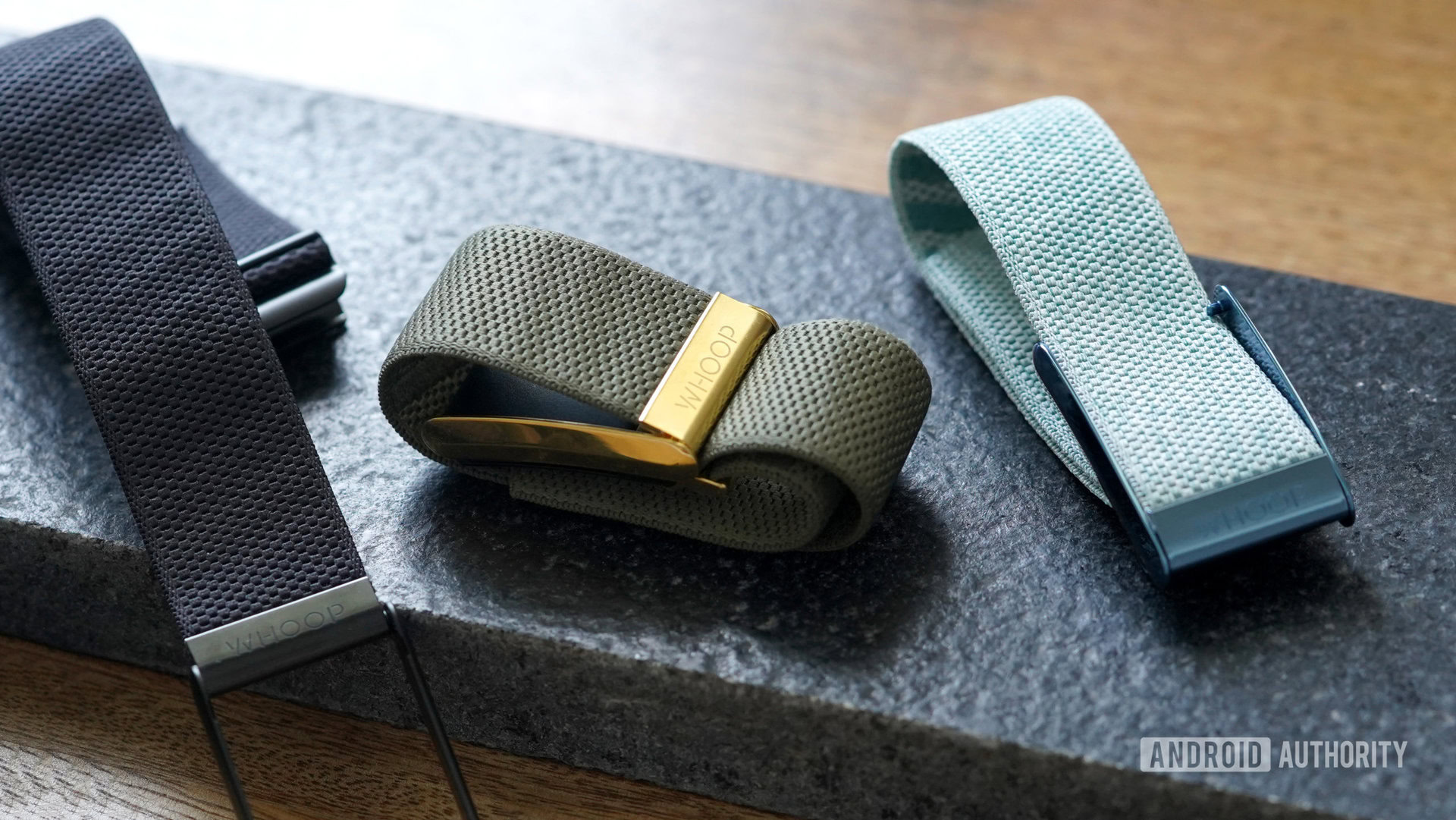
Kaitlyn Cimino / Android Authority
In a market oversaturated with options, the Whoop 4.0 is a unique device. Its minimalist design includes a small, lightweight tracker (roughly 33% smaller than the Whoop 3.0), a comfortable knit band, and a metallic clasp. No colorful AMOLED display, or even a black and white LCD one. No screen at all. That means no notifications, on-screen stats, or distractions, and all these omissions have a delightful effect.
For starters, the Whoop 4.0 is simply good-looking. The Luxe bands in particular are genuinely attractive, and I received a number of unprompted, positive remarks throughout my testing period. Considering I wore my band during the Thanksgiving holidays, I was grateful for the go-to icebreaker during family small talk. “Ah yes, this is the Whoop 4.0, I have a pretty blue strap for it back at the hotel too!”
Without a flashy screen and animations, the Whoop strap provides a stark contrast to many of the most popular wearables. It doesn’t just blend in with your wardrobe, it accents and elevates everyday wear. With that intent, Whoop sells a huge range of colorways so finding a band that fits your style is easy.
Plenty of trackers tout swappable bands for mixing up your look — I have multiple Apple Watch bands but rarely vary from my go-to nylon staple. In contrast, during this review period alone, I swapped my Whoop band at least a dozen times. A complete sucker for anything green, I wore my Ivy option with its classy gold clasp the most. During USA World Cup games, I swapped into the blue kit for good luck (it didn’t work). The standard black I reserved for sweaty runs and hikes. In short, the Whoop band feels a lot less like a tracker than a customizable accessory. The bands aren’t cheap ($49-$99), but it will likely feel worth the splurge.
Without a display, the highly-customizable Whoop 4.0 is an elegant accessory for everyday wear.
It’s also easily the most comfortable wearable I can remember testing. Considering it’s designed to be worn 24/7, that shouldn’t be surprising. However, tons of trackers make the same claim, and this is the first I’ve found to very nearly live up to the hype. The exception I encountered was a personal preference. I tried to wear the band in the shower, and post-rinse, the moist strap gave me the heebie-jeebies. Luckily, the team at Whoop sent me alternative bands so I was able to swap into a dry option.
If, however, you’re strangely comfortable wearing what feels like a wet sweatband for a few hours, you could theoretically keep your device on nonstop. It’s water-resistant to depths of ten meters (much deeper than my bathtub) for up two hours and safe for swimming in chlorinated water or salt water.
A battery built for all-day wear
Like past generations, the Whoop 4.0 is intended to remain on your wrist, including while charging. The upgraded battery pack is even water resistant and can join you and your Whoop band during a shower if that’s ever necessary. A swift double tap on the battery will display its charge level. A red status light means you are low and a green one means you have juice left in the tank.
The strap is designed to be worn 24/7, including while charging, so users never miss important data.
I found it most convenient to charge during work hours as the pack is lightweight and secures on well enough for typing away at a computer. The band gives off a real bulky-turtle vibe with the battery attached, so I wouldn’t make a habit of leaving the house with it clipped on anyway. Plus, a replacement battery costs $49, which is no small fee if you lose it while out and about.
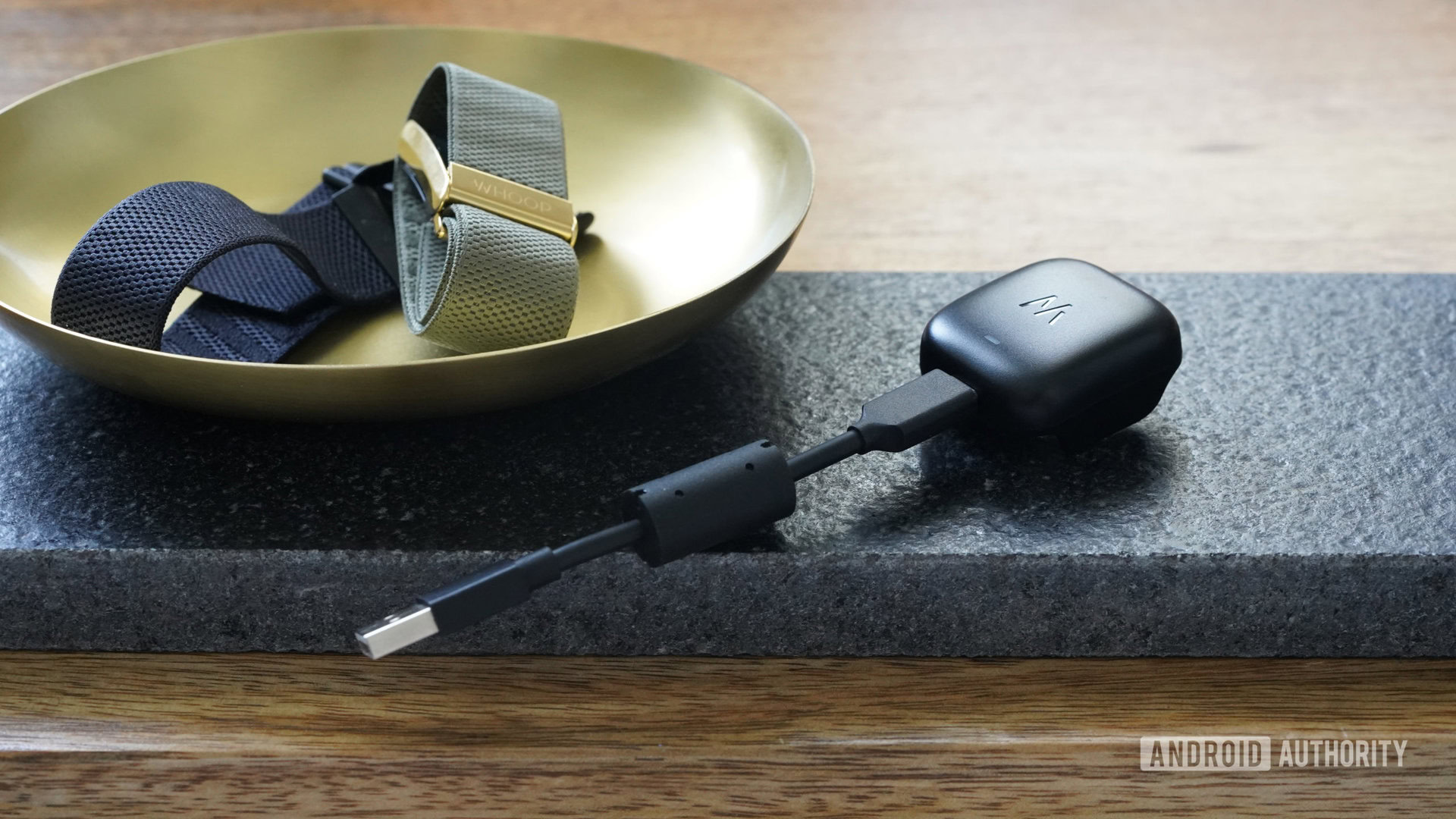
Kaitlyn Cimino / Android Authority
The battery pack itself charges via the world’s shortest USB-C cable. As a neat freak who loathes cord nests, I genuinely appreciate the utilitarian design. I left my battery plugged in throughout the Whoop review period (outside of the time it spent on my device) and it didn’t disrupt my desk space in the slightest. Once on the tracker, the battery charged the device in just over two hours. Each charge lasted me about five days. Again, nearly a week between charges is extremely convenient and a huge benefit of skipping out on a power-draining display.
And also all-night wear
Another unforeseen plus of the screen-free wearable is disruption-free sleep. Despite sleep modes and preset schedules, I am often distracted by my smartwatch in bed. If I’m not being woken up by a bright screen, I’m already awake, disabling sleep mode to send one last trivial text.
Not only is the Whoop 4.0 comfortable enough to wear while sleeping, but it accurately tracked my sleep. The latest model added SpO2 tracking as well as a temperature sensor, and both are leveraged for overnight data. It was spot on for sleep and wake times, and my sleep stages aligned closely with my Fitbit Versa 3, a notably accurate sleep tracker. As with other data sets in the Whoop app, I appreciate how well-organized sleep analysis is provided. Since these features are largely carried over from the previous model, I won’t go into too much detail.
The band is a very accurate sleep tracker, and Whoop successfully turns your sleep data into actionable insights.
Personally, I found the Journal feature of Whoop’s sleep-tracking suite quite useful, although the daily prompt is somewhat aggressive. “What happened yesterday?” immediately gets my heart rate up. As before, users can specify what behaviors they want to record and then analyze how those behaviors affect their sleep over time. I saw predictable trends when it came to caffeine and alcohol consumption, but I was somewhat surprised to see how much my sleep correlated with hydration and certain mental health factors such as gratitude, outdoor time, and social fulfillment.
This aspect of the Whoop experience is a great example of how an unobtrusive tracker can provide very real value when paired with a robust app. The sleep insights Whoop provides are easy to translate into practical changes.
A set-and-forget fitness tracker
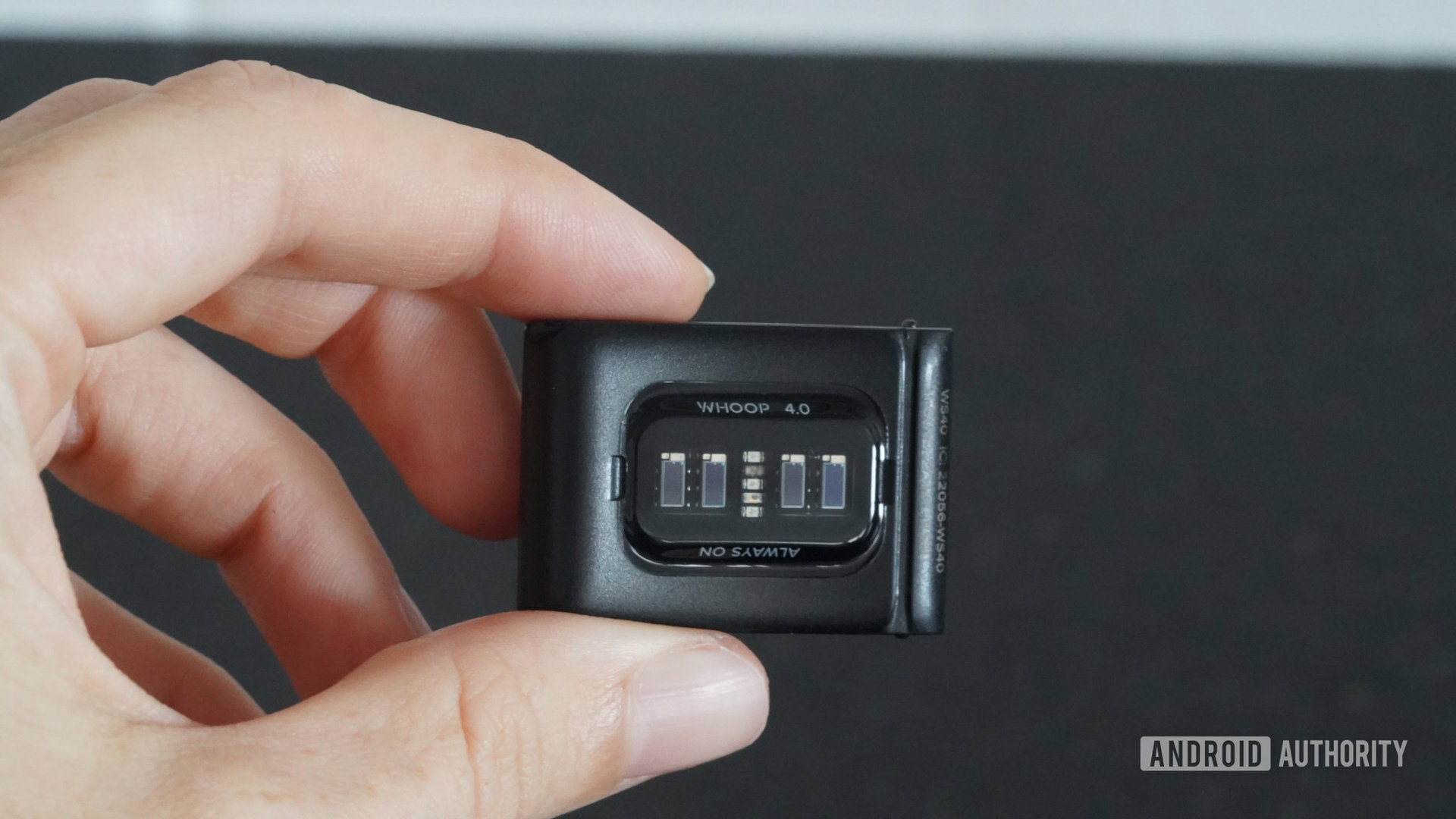
Kaitlyn Cimino / Android Authority
To that same end, the key to the Whoop experience is that you don’t have to think about it. It’s the fitness tracker version of the sentiment that the best camera is the one that’s with you. The device pairs a newly improved heart rate sensor with the same great app experience to offer users a fitness tracker that doesn’t impose on your day-to-day.
Just like the previous model, the Whoop 4.0 tracks your heart rate at all times. It then translates that data into “strain” to represent how hard you work each day. When it detects that you are exercising, the band automatically begins recording a workout, and it ends the workout when it detects you are finished. Over in the Whoop app, you can confirm the workout, adjust details if needed, and review your heart rate data during the recorded activity.
Whoop uses 24-hour heart rate data to determine a user’s daily strain and automatically detects workouts in the Whoop app, so you don’t have to.
Again, this happens automatically with impressive accuracy. Should the band miss a workout, you can manually add details in the app. Since heart rate data is always recorded regardless of what you are doing, you just have to scroll to the appropriate time and specify your activity type. On the other hand, if Whoop detects a phantom workout, you can also delete the “workout” label, but you cannot delete the heart rate data itself.
This method of tracking activity is surprisingly liberating. Rather than focusing on closing rings or starting the correct sport mode, the Whoop strap encourages users to exercise for the sake of exercising, then check in when it’s convenient. No fumbling with your watch before a run, no counting steps throughout the day. Just pure heart rate data. You can start a workout on the app if you want, and can even track GPS data if you bring your phone, but the point is, you don’t have to.
Given that the tracker relies heavily on heart rate data, I was also happy to see a lot of improvement in accuracy. The Whoop 4.0 performed well compared to my Polar strap and other wearables during most workouts. It’s still not perfect in nailing high-intensity bursts, but overall, the data was reliable for Whoop’s purposes. Unfortunately, you still can’t pair your Whoop 4.0 with a chest strap if detailed accuracy is a priority.
When you are ready to review your day’s work, your data is organized into the same categories as the previous model: strain and recovery. The app is incredibly intuitive and displays results in a user-friendly manner that’s easy to digest. As before, you can dive into more details across strain, recovery, and sleep data and enable coaching. Tapping into a workout will pull up its heart rate graph plus activity stats. Tapping on a given sleep session will open a breakdown of your sleep stages and wake events, plus, of course, another heart rate graph.
You can also view your results across all categories in weekly and monthly data sets to dig into personal trends and patterns. Whoop automatically calculates averages and offers helpful insights about your behavior. All in all, the app is loaded with information and direction to help guide you to your health goals.
Like Nebraska, Whoop is not for everyone
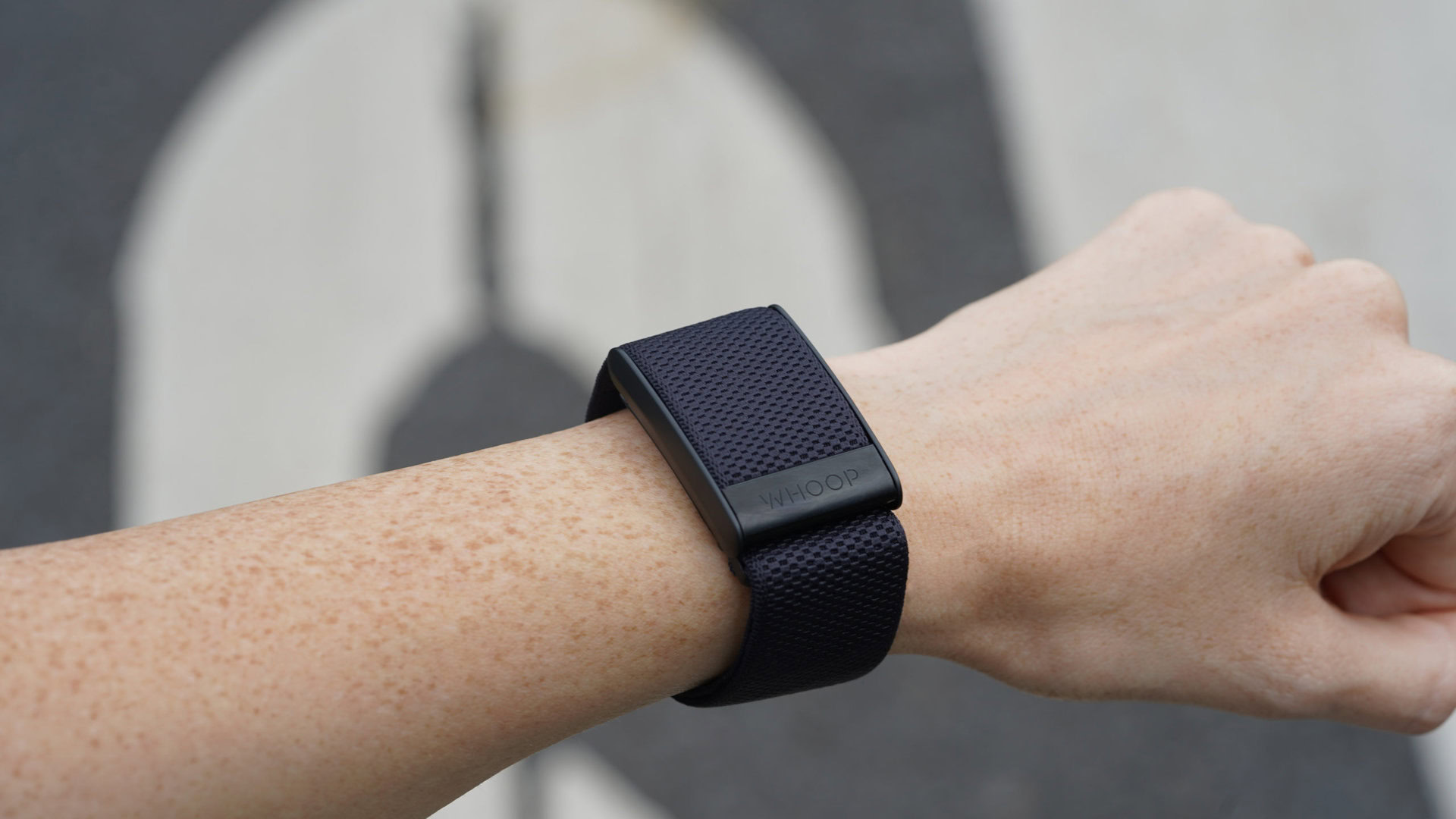
Kaitlyn Cimino / Android Authority
Whoop cuts out a lot of the details that can turn fitness tracking into an obsession with stats instead of an avenue for wellness. However, athletes who rely on real-time data such as pace, distance, or heart rate zones will not be fans of the screen-free wearable. Likewise, outdoor enthusiasts looking for navigation tools and onscreen mapping should also shop elsewhere. If you often need to know the time, Whoop can’t help you either. Admittedly, that last one took some getting used to.
The Whoop band offers absolutely no on-wrist benefits beyond aesthetics and a surprisingly effective alarm. (The haptic is new in this generation, and, if enabled, will wake you during the optimal sleep cycle.) Everything else happens in the app, where Whoop emphasizes the balance between how hard you work and how your body recovers.
If you value real-time metrics like pace, distance, or a clock, the Whoop band probably isn’t for you, but the lack of on-wrist data can also be refreshing.
On the other hand, I was pleasantly surprised to see how well the Whoop platform integrates with other popular fitness tools and services. Workouts can be uploaded to Strava, and you can also broadcast Whoop’s heart rate data to third-party apps and devices like Peloton.
As the line between fitness trackers and smartwatches continues to blur, the Whoop strap remains a rare example of pure tracking. It’s not offering to make phone calls, play music, or make contactless payments, and honestly, it’s kind of nice. Many of us are so emotionally attached to our phones, a second screen attached to our bodies isn’t necessary. Will I go back to Apple or Garmin? Yes, probably. But this month has been a refreshing reminder that connectivity can be exhausting, and that on-screen metrics are sometimes quite draining. The Whoop 4.0 offers an alternative.
Whoop 4.0 review: Should you buy it?
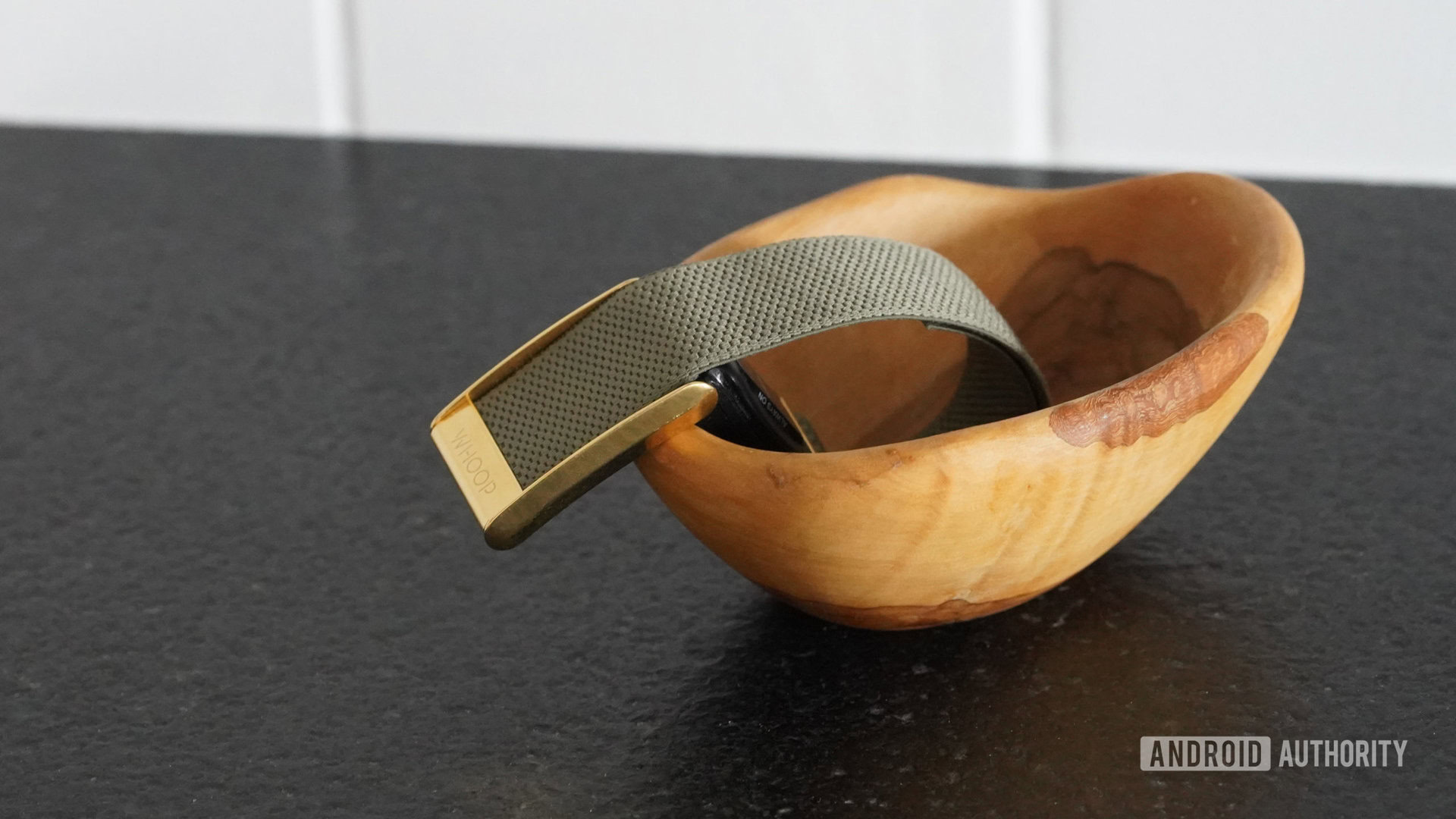
Kaitlyn Cimino / Android Authority
All that being said, the pricing structure of the Whoop 4.0 may still warrant hesitation. While the strap offers a passive tracking experience, the subscription structure is anything but.
Technically, the Whoop 4.0 hardware is free. Rather than paying for the tracker itself, interested buyers are required to commit to a 12-month membership. Each month, Whoop pulls $30 out of your wallet, making the device a relatively expensive investment in the long run. If you are willing to pay upfront, you can lower the monthly price by about $5.
With its subscription-based pricing structure, the Whoop 4.0 is far from an affordable tracker.
At face value, $360 isn’t totally outside the realm of logic for a reliable fitness tracker. After that first year though, the ongoing fee is no bargain. If you keep your devices for multiple years, the cost of the Whoop 4.0 is more comparable to premium devices like the Apple Watch Ultra or Garmin Fenix 7. Unfortunately, subscription fees are a growing trend. However, I can get a lot out of my Apple Watch without paying for Apple Fitness Plus, and many people successfully use Fitbit devices without opting for Fitbit premium. Whoop is unique in that the membership is necessary to use the device in any capacity.
If you do buy in, you are at least taken care of in terms of future-proofing. Should Whoop release a new generation of hardware during your membership, you will automatically be eligible for the upgraded model.
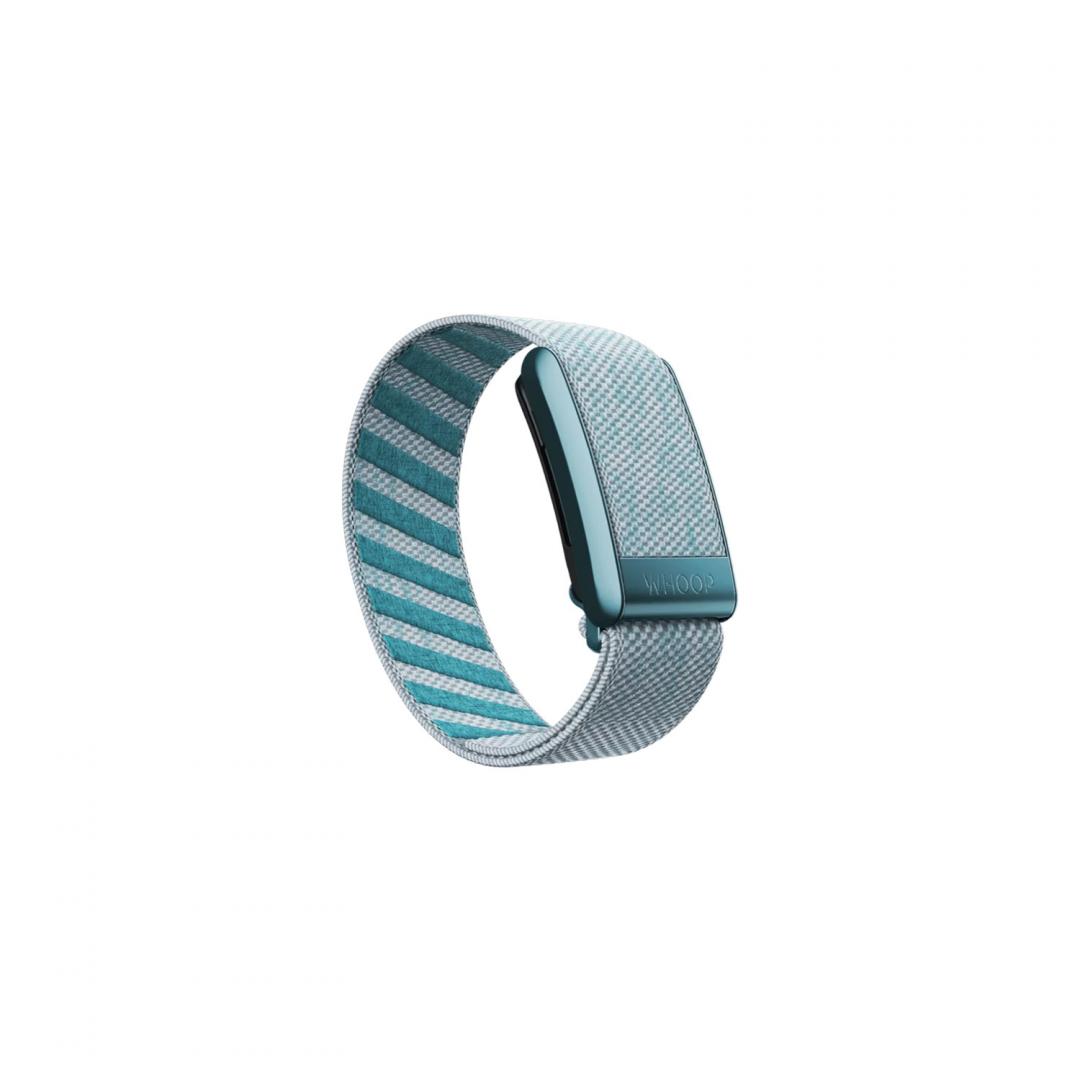
Whoop 4.0
Useful recovery data • Comfortable for all day wear • Detailed sleep tracking
A no-distractions fitness tracker for athletes
The Whoop 4.0 aims to help users determine their daily strain and recovery, leveraging heart rate data. The lightweight tracker can be worn on the wrist or elsewhere on the body with Whoop’s sensor-enhanced apparel. Notably, utilizing the Whoop 4.0 requires a monthly subscription.
[ad_2]